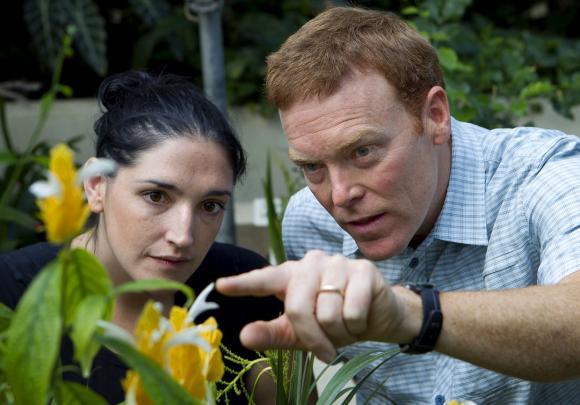PROVIDENCE, R.I. [Brown University] — Mark Johnson, associate professor of biology, has joined a consortium of seven other researchers in four European countries to develop the fullest understanding yet of how fertilization evolved in flowering plants. The research, employing techniques such as comparative genomics and molecular biology, could ultimately help agronomists improve crop yields for a hungry world.
“Our project will deliver the first comprehensive view of the molecular evolution of plant sexual reproduction and will provide insights into the origins of fertilization in flowering plants,” said group leader Jörg Becker at the Instituto Gulbenkian de Ciência in Portugal. “This will be a crucial step in our quest to develop tools to manipulate plant reproduction in our favor and improve crop productivity.”
Johnson said his lab will focus on the evolution of mechanisms underlying double fertilization, the process by which flowering plants not only fuse sperm and egg, but also where a second sperm fuses with a central cell that develops into much of the rest of the seed (including the “endosperm” that provides nutrition and protection for the embryo). In prior work, his lab has identified a key protein in the model plant Arabadopsis. With about $540,000 provided by the U.S. National Science Foundation Plant Genome Research Program as part of the total project’s $2.9-million in funding, he will be able to learn whether that protein plays a similarly crucial role in crops like tomatoes. Johnson will hire a new postdoctoral scholar for that work.
“This project is particularly exciting because in recent years, the group of investigators involved has made a lot of progress toward understanding some of the molecules that are involved in flowering plant reproduction by focusing on Arabidopsis,” Johnson said. “Our goal is to use comparative genomics approaches to fill in gaps in our understanding of how plant reproduction works and to define the aspects of the mechanisms we’ve discovered so far that are either ancient or new innovations.”
Johnson’s lab will also use genome editing techniques to learn whether the proteins he’s studying are not only present across flowering plants, but also how they are important.
Overall, Johnson said, “These studies have the potential to yield new insights into how critical crop products like corn kernels and tomato fruits are produced.”

